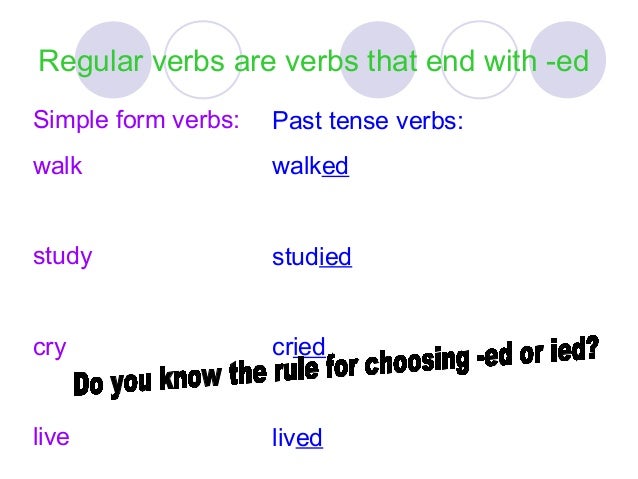
Note that the present participle cannot function as a predicate unless it has an auxiliary verb. To form the present participle, the suffix ing is generally added to the basic form: The infinitive form is a compound verb made up of the preposition to and the basic form: The basic form (or root) is the form listed in the dictionary, which is generally the first-person singular of the simple present tense (except in the case of the verb to be): There are four principal forms: basic or root, present participle, past and past participle. Come back whenever you need to.English verb tenses are formed by combining one of the principal forms of a main verb with one or more auxiliary verbs. We’ve got a whole content library of articles dedicated to explaining confusing words and phrases. You might be able to remember if you think about how ‘lost’ is the past tense of ‘lose,’ and they both end in the letter ‘t.’ But if you ever get stuck, just come back here to this page and refresh your memory. The subtle differences in the words should provide clues about usage. Now that you know the difference between ‘loss’ and ‘lost,’ you should have no trouble using them both in a sentence correctly (especially with the above sentences as a guide).
#Past tense of lose how to#
How to Use ‘Lost’ Correctly in a Sentence

I don’t need another loss like the one I suffered last year.My niece took the loss of my sister really hard.My grandmother’s passing last year was a real loss for our family.That broken wheelbarrow was a real loss to our farm.Take look at how to use ‘loss’ correctly in a sentence: How to Use ‘Loss’ Correctly in a Sentence Now that you know the difference between the two let’s discuss how to use both words in a sentence correctly. ChoseĪnother set of words that come from the same root word but have slightly different meanings is ‘ choose’ and ‘chose.’ In this case, ‘chose’ is simply the past tense of ‘choose.’ You’reĮven native English speakers tend to confuse ‘ your’ and ‘you’re.’ The difference is ‘your’ implies possession, and ‘you’re’ is a contraction of ‘you are.’ Choose vs. ‘ Margarita’ refers to the drink, while ‘Margherita’ refers to pizza.

While these words sound the same, they mean different things. It also means: “no longer visible,” “lacking assurance or self-confidence: helpless,” “rapt, absorbed,” “not appreciated or understood: wasted,” “obscured or overlooked during the process or activity,” and “hopelessly unattainable: futile.”Ī lot of words in the English language sound similar but mean different things. The Merriam-Webster definition of ‘lost’ is: “not made use of, won, or claimed,” “no longer possessed,” “no longer known,” “ruined or destroyed physically or morally: desperate,” “taken away or beyond reach or attainment: denied,” “insensible, hardened,” and “unable to find the way.” It also means: “losses plural: killed, wounded, or captured soldiers,” “the power diminution of a circuit or circuit element corresponding to the conversion of electrical energy into heat by resistance,” “failure to gain, win, obtain, or utilize,” “an amount by which the cost of something exceeds its selling price,” “decrease in amount, magnitude, value, or degree,” “the amount of an insured’s financial detriment by death or damage that the insurer is liable for,” and “the distance the ball is moved away from the goal during a play. The Merriam-Webster definition of ‘loss’ is: “destruction, ruin,” “the act or fact of being unable to keep or maintain something or someone,” “the partial or complete deterioration or absence of a physical capability or function,” “the harm or privation resulting from losing or being separated from someone or something,” “an instance of losing someone or something,” and “a person or thing or an amount that is lost.” That’s why we should define both words to get a clearer picture. Whether you’ve ‘lost’ a game or suffered a terrible ‘loss’ when you lost someone close to you, it’s important to know how to use each word correctly.

Now that you know the difference between the two let’s talk about how to use each one correctly. Although they sound similar, they don't sound exactly the same (like homophones). However, ‘lost’ is the past tense of ‘lose’, and ‘loss’ describes the act of losing something or someone. Lost: What’s the Difference?Īs you just learned above, ‘loss’ and ‘lost’ both have to do with losing. Final Thoughts on ‘Loss’ and ‘Lost’ Loss vs.


 0 kommentar(er)
0 kommentar(er)
